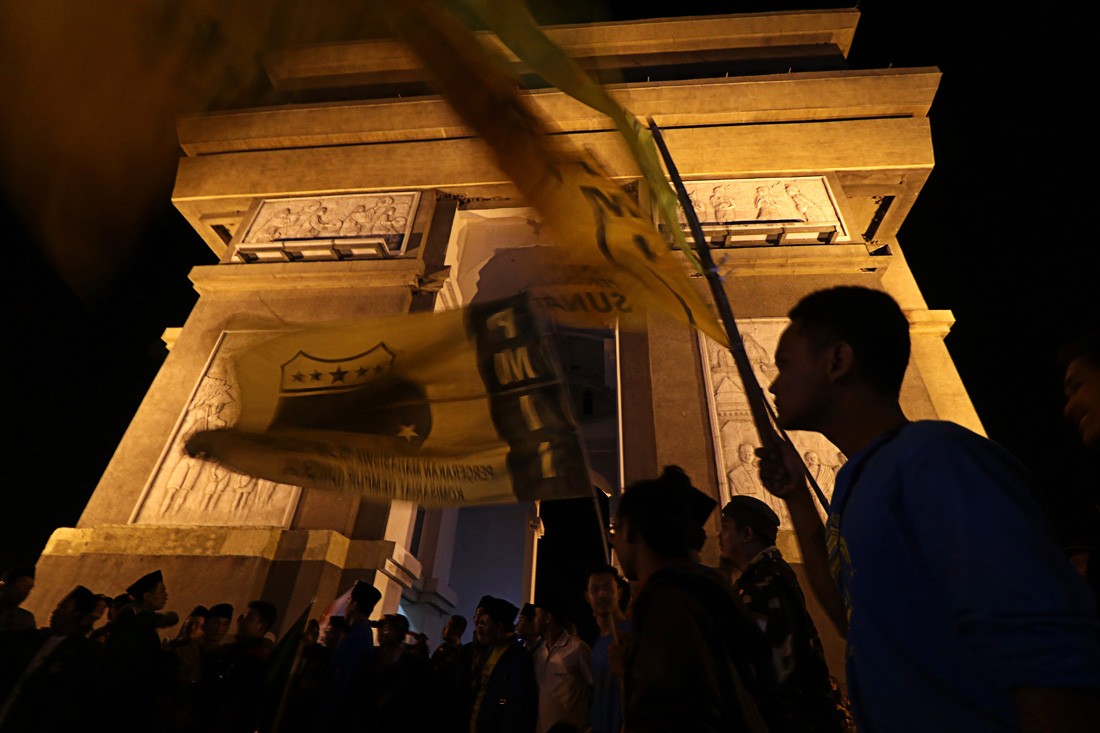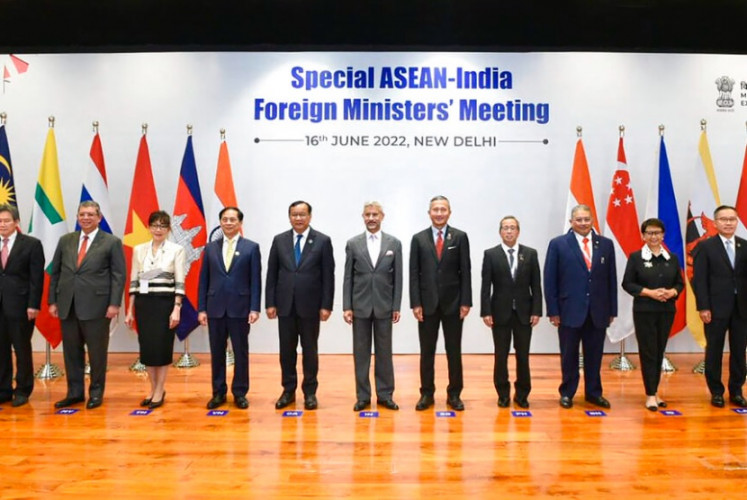Commentary: Let freedom beat terrorist ideology
Changing the hearts and minds of extremist Muslim combatants with moderate teachings is nearly impossible.
Change Size
 Showing sympathy: University students joining with the Indonesia Muslim Students Movement (PMII) attend a rally at Simpang Lima Gumul Monument in Kediri, East Java, on May 13, to show their solidarity to victims of suicide bombings in Surabaya, East Java.. (Antara/Prasetia Fauzani)
Showing sympathy: University students joining with the Indonesia Muslim Students Movement (PMII) attend a rally at Simpang Lima Gumul Monument in Kediri, East Java, on May 13, to show their solidarity to victims of suicide bombings in Surabaya, East Java.. (Antara/Prasetia Fauzani)
T
error suspects in the suicide bomb attacks in Surabaya had freely learnt intolerant and radical interpretations of Islamic teachings since their youth, according to the testimony of former schoolmates. To fight the extreme ideology and curb hate speech, the government should not ban youths from studying anything. Ironically teachings of murderous hatred are spread freely while liberalism, socialism, communism and atheism are banned or branded haram.
Throughout all the terror attacks in Indonesia, we hear the same response: Denial. Many Muslim leaders, also President Joko “Jokowi” Widodo, have quickly stated that the latest terror attacks, which so far have killed 25 people and injured dozens, have nothing to do with Islam. “Terrorism has no religion,” he said.
Agreed. But the terrorists have religion.
One of the suicide bombers, Dita Oeprianto, who led his family to fatal destruction, was a student of the best state-run high school in a complex of four state-run high schools in downtown Surabaya. Intolerance was part of the religious teachings in the extra-curricular activities. In the late 1980s, I was a member of those classes called kerohanian Islam, or rohis, in one of the schools. Regularly the students would invite ustad (religious teachers) who sounded narrow-minded, including their seniors studying in top state-run universities.
Many of those students came from middle-class families with not so strong Islamic backgrounds. Many could not read the Quran fluently, although they later could remember certain verses and teachings, especially that Islam is the true religion and others are fake.
Teachings of Wahabiism and Shiism were favorites among the rohis students at that time. Moderate teachings, like those practiced by Nahdlatul Ulama members, were unpopular. Many of the graduates then entered state universities and became professors, doctors or journalists.
A few became depressed since the teachings urged them to fight friends and even parents who did not share their beliefs in multicultural Surabaya. A few were even treated in mental hospitals. A few others dropped out from university. What became of Dita was thus shocking but not too surprising.
In state universities, such graduates again learned intolerant interpretations of Islamic teachings in full freedom. Student boards in state universities in Sumatra and Java are dominated by students who aspire to an Islamic state of Indonesia. They are either members of Hizbuth Tahrir Indonesia (HTI), the organization recently banned by the government, or youth wing members of the Islamist Prosperous Justice Party (PKS).
In January 2017, hundreds of those students from various universities gathered at the Bogor Institute of Agriculture (IPB) in West Java, pledging support for sharia and the caliphate in Indonesia and other countries. You can still watch their oath-taking on Youtube, which the IPB said it did not endorse.
Relatively few students in those state universities are free from Islamist movements. Some join student press activities and others join discussion groups supporting liberal and leftist thoughts — in secret.
Last September, discussions on human rights violations during the 1965 tragedy, held by universities and non-governmental organizations, were broken up by Islamic hardliners or by police under their pressure.
Intolerant teachings do not automatically change people into suicide bombers. It takes a long process until what we saw in Surabaya and other places in the country in the past.
How do we tackle potential suicide bombers? How do we deal with intolerance that justifies violence?
Fight the ideology with other ideologies. Fight the teachings with alternative teachings.
Despite their flaws, deradicalization programs for terrorist convicts should be extended to state-run senior high schools and universities, including teaching institutes and schools supported by Middle East countries, schools which still preach intolerance.
Changing the hearts and minds of extremist Muslim combatants with moderate teachings is nearly impossible.
Those fighters believe suicide bombing is a strategy in jihad, based on their interpretation of the Uhud war led by Prophet Muhammad. They believe suicide frightens infidel enemies, and is not stupid or useless.
Although the Indonesian Ulema Council (MUI) has condemned suicide bombing, it remains “heroic” for misled youths; while MUI’s fatwa, though non-binding, has stated “pluralism, secularism and liberalism is haram”.
However, youths should not only be taught moderate and tolerant teachings, they should also be given the freedom to search and learn alternative discourses.
Encourage universities to hold scientific, open discussions on liberalism and other isms. Those opposing the discussions should be allowed to rally, but not to disperse the talks.
As part of the learning process, the government should not ban leftist books, nor websites on atheism and sexual minorities — who also bear the brunt of
intolerance.
Let the youth decide whether they want to be pious or disbelieve in heaven. Law enforcers should act against hate speech and step up efforts to prevent terrorism.
Freedom will provide suicide bomber candidates other alternatives than dying for questionable causes while murdering others. Freedom will make them learn how to love life and humanity.
***
The writer is the founder of Sejuk, the Association of Journalists for Diversity.









